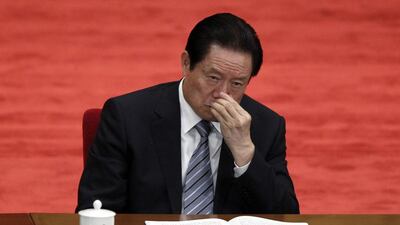BEIJING // Chinese authorities placed the feared former security chief Zhou Yongkang under formal arrest early on Saturday to investigate his suspected crimes, including accepting bribes, adultery and leaking the country’s secrets, state media said.
Mr Zhou, a former member of the powerful nine-member Politburo Standing Committee, also was expelled from the Communist Party, making him the most senior figure to be snared in President Xi Jinping’s anti-corruption crackdown.
Mr Zhou is the highest-level official to be prosecuted since the 1981 treason trial of Mao Zedong’s wife and other members of the Gang of Four who persecuted political opponents during the 1966-76 Cultural Revolution.
He had been under investigation for “severe disciplinary violations” – a phrase usually used to describe corruption – since July and presumably had been detained by party investigators months earlier. He had not been seen publicly since October 2013.
“He abused his power to help relatives, mistresses and friends make huge profits from operating businesses, resulting in serious losses of state-owned assets,” the official Xinhua News Agency said. Prosecutors were taking on the case.
The decision to expel Mr Zhou was made on Friday after a meeting of the Political Bureau of the party’s Central Committee deliberated over an investigation report on Mr Zhou, who was in charge of China’s massive domestic security apparatus before his retirement in 2012.
The investigation found that Mr Zhou had “seriously violated the party’s political, organisational and confidentiality discipline”, the report said.
“Zhou leaked the party’s and country’s secrets,” the report went on to say. “He seriously violated self-disciplinary regulations and accepted a large amount of money and properties personally and through his family. Zhou committed adultery with a number of women and traded his power for sex and money.”
By targeting Mr Zhou, Mr Xi showed the considerable power he has amassed since he took the helm of the party in November 2012.
Former members of the powerful Politburo Standing Committee had long been considered off-limits for prosecution in an unwritten rule aimed at preserving party unity. But mr Xi vowed to go after both low and high-level officials in his campaign to purge the party of corruption and other wrongdoing that have undermined its legitimacy in the public eye.
Mr Zhou was once perceived as untouchable, with expansive patronage networks covering the sprawling south-western province of Sichuan where he was once party boss and controlled the state oil sector, police and courts.
More significantly, as China’s security chief, he oversaw the country’s domestic spy agencies, a position that afforded him access to information on other high-ranking politicians who might pose a threat to him.
Mr Zhou was born the son of an eel fisherman in a little-known eastern village, the eldest of three boys and the only one to attend university, from which he graduated as an engineer, according to financial news magazine Caixin.
He spent the early part of his career in the oil sector, rising through the ranks over several decades to become the general manager of China National Petroleum Corp, one of the world’s biggest energy companies, in 1996.
He then served as party chief of Sichuan province between 1999 and 2002, and became a Politburo Standing Committee member and the national security chief in 2007.
* Associated Press

